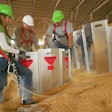
Unfilled grain car orders — the number of cars a shipper, like a grain elevator, ordered but did not receive — areup 231%between the second quarter of 2021 and second quarter of 2022, according toAmerican Farm Bureau FederationEconomistDaniel Munch.
Service for grain shippershas been inadequatesince Munch’s first quarterMarket Intelanalysis, and consequences are rippling across the ag supply chain.
Shipping delays crisscross the nation
“Most order delays are lasting 11 days or more, putting grain mills or livestock operations reliant on a steady stream of raw materials and feed in limbo,” Munch wrote.
After months of contending withUnion Pacific’s service failures on corn shipments of 100-car unit trains, Livingston, CA-basedFoster Poultry Farmsfiled anemergency service orderwith the Surface Transportation Board to alleviate harm to its poultry flocks.
The STB ordered UP in June to deliver on its commitment to move the unit trains of corn from origins across the Midwest to California for Foster to process corn meal for poultry feed.
Earlier this summer, farmer-ownedLandus Cooperativesaid in a letter to the STB that rail transit times have more than doubled. The cooperative buys grain from 7,000 farmers in Iowa and has been forced to turn away loads of corn and soybeans at country grain storage elevators while waiting 20 days for rail carriers to pick up loaded grain cars.
Proposed bill could level playing field for ag shippers
To bring back adequate, resilient freight rail service to agricultural stakeholders,Peter DeFazio (D-OR), House Transportation and Infrastructure Committee Chairman andDonald Payne, Jr. (D-NJ), Subcommittee Chairman, drafted a transportation bill aimed at improving freight rail service for agricultural shippers.
The Freight Rail Shipping Fair Market Act, supported by trade groups like theNational Grain and Feed Association, would reauthorize the STB to create rules for shippers to charge demurrage on railroads, providing customers a way to incentivize the railroads’ performance the same way railroads incentivize their customers.
“The draft Freight Rail Shipping Fair Market Act includes sensible and necessary policy measures to level the playing field for agricultural shippers currently operating in a non-competitive system,” NGFA said in a statement.
If passed, the bill would enact policies to deter future rail service failures and further define the common carrier obligation for railroad performance to reach established minimum service standards.
NGFA urged its members to contact their Congressional representatives to support the bill and help address insufficient rail service across the agricultural supply chain.






















